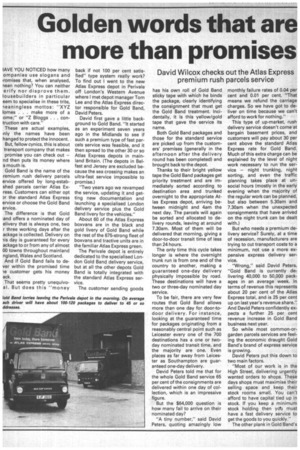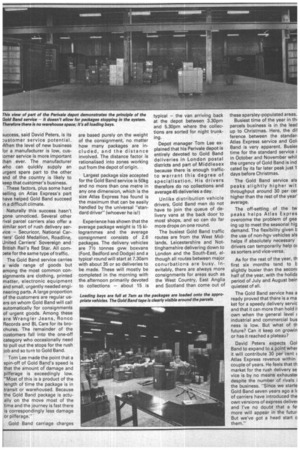Golden words that are more than promises
Page 28

Page 29

If you've noticed an error in this article please click here to report it so we can fix it.
David Wilcox checks out the Atlas Express premium rush parcels service
1AVE YOU NOTICED how many ompanies use slogans and iromises that, when analysed, lean nothing? You can neither erify nor disprove them. lousebuilders in particular eem to specialise in these trite, ieaningless mottos: "XYZ lomes . . make more of a ome;" or "Z Bloggs . . contruction with care."
These are actual examples, Inly the names have been hanged to protect the innocent. But, fellow cynics, this is about transport company that makes promise you can check out — nd then puts its money where s mouth is.
Gold Band is the name of the remium rush delivery parcels ervice offered by long-estabshed parcels carrier Atlas Exress. Customers can either opt r the standard Atlas Express ervice or choose the Gold Band ervice.
The differenceis that Gold and offers a nominated day of elivery that is always one, two r three working days after the ackage is collected. Delivery on us day is guaranteed for every ackage to or from any of almost 00 towns throughout mainland ngland, Wales and Scotland. And if Gold Band fails to clever within the promised time ie customer gets his money ack.
That seems pretty unequivoal. But does this "money back if not 100 per cent satisfied" type system really work? To find out I went to the new Atlas Express depot in Perivale off London's Western Avenue where I met depot manager Tom Lee and the Atlas Express director responsible for Gold Band, David Peters.
David first gave a little background to Gold Band. "It started as an experiment seven years ago in the Midlands to see if such a premium type of fast parcels service was feasible, and it then spread to the other 30 or so Atlas Express depots in mainland Britain. (The depots in Belfast and Jersey are excluded because the sea crossing makes an ultra-fast service impossible to promise.) "Two years ago we revamped the service, updating it and getting new documentation and launching a specialised London delivery service plus the Gold Band livery for the vehicles."
About 60 of the Atlas Express boxvans are in the black and gold livery of Gold Band while the rest of the 675-strong fleet of boxvans and tractive units are in the familiar Atlas Express green.
The Perivale depot is entirely dedicated to the specialised London Gold Band delivery service, but at all the other depots Gold Band is totally integrated with the standard Atlas Express service.
The customer sending goods has his own roll of Gold Band sticky tape with which he binds the package, clearly identifying the consignment that must get the Gold Band treatment. Incidentally, it is this yellow/gold tape that gave the service its name.
Both Gold Band packages and those for the standard service are picked up from the customers' premises (generally in the afternoon after the delivery round has been completed) and brought back to the depot.
Thanks to their bright yellow tape the Gold Band packages get priority treatment and are immediately sorted according to destination area and trunked overnight to the appropriate Atlas Express depot, arriving between midnight and 4am the next day. The parcels will again be sorted and allocated to delivery rounds, leaving at around 7.30am. Most of them will be delivered that morning, giving a door-to-door transit time of less than 24 hours.
The only time this cycle takes longer is where the overnight trunk run is from one end of the country to another, making a guaranteed one-day delivery physically impossible by road. These destinations will have a two or three-day nominated day service.
To be fair, there are very few routes that Gold Band allows more than one day for door-todoor delivery. For instance, looking at the guaranteed time for packages originating from a reasonably central point such as Leicester every one of the 700 destinations has a one or twoday nominated transit time, and the majority are one. Even places as far away from Leicester as Southampton are guaranteed one-day delivery.
David Peters told me that for the whole Gold Band service 65 per cent of the consignments are delivered within one day of collection, which is an impressive figure.
But the $64,000 question is how many fail to arrive on their nominated day?
"A tiny number," said David Peters, quoting amazingly low monthly failure rates of 0.04 per cent and 0.01 per cent. "That means we refund the carriage charges. So we have got to deliver on time because we can't afford to work for nothing."
This type of up-market, rush delivery service doesn't come at bargain basement prices, and customers will pay about 30 per cent above the standard Atlas Express rate for Gold Band. Much of this extra charge can be explained by the level of night work necessary to run the service — night trunking, night sorting, and even the traffic planning takes place at unsocial hours (mostly in the early evening when the majority of the regular work can be planned, but also between 5.30am and 7.30am when the unexpected consignments that have arrived on the night trunk can be dealt with.)
But who needs a premium delivery service? Surely, at a time of recession, manufacturers are trying to cut transport costs to a minimum, not use a more expensive express delivery service.
"Wrong," said David Peters. "Gold Band is currently delivering 40,000 to 50,000 packages in an average week. In terms of revenue this represents about 20 per cent of the Atlas Express total, and is 25 per cent up on last year's revenue share." And David Peters confidently expects a further 25 per cent revenue increase in Gold Band business next year.
So while most common-orgarden parcels services are feeling the economic draught Gold Band's brand of express service is growing.
David Peters put this down to two main factors.
• "Most of our work is in the High Street, delivering urgently wanted orders to shops. These days shops must maximise their selling space and keep their stock rooms small. You can't .afford to have capital tied up in stock. If you keep a minimum stock holding then yciti must have a fast delivery service to get the goods to you quickly."
The other plank in Gold Band's success, said David Peters, is its customer service potential. Nhen the level of new business for a manufacturer is low, customer service is more important than ever. The manufacturer Nilo can quickly supply an Jrgent spare part to the other and of the country is likely to keep that customer's business.
These factors, plus some hard selling on Atlas Express's part have helped Gold Band succeed in a difficult climate.
Naturally this success hasn't gone unnoticed. Several other rival parcel carriers also offer a similar sort of rush delivery service — Securicor, National Carriers' Gold Medallion, Roadline, United Carriers' Sovereign and • British Rail's Red Star. All COMDete for the same type of traffic.
The Gold Band service carries a wide range of goods but among the most common consignments are clothing, printed matter, electronic equipment and small, urgently needed engineering parts. A large proportion of the customers are regular users on whom Gold Band will call automatically for consignments of urgent goods. Among these are Wrangler Jeans, Ronco Records and BL Cars for its brochures. The remainder of the customers fall into the one-off category who occasionally need to pull out the stops for the rush job and so turn to Gold Band.
Tom Lee made the point that a spin-off of Gold Band's speed is that the amount of damage and pilferage is exceedingly low. "Most of this is a product of the length of time the package is in transit or warehoused. Because the Gold Band package is actually on the move most of the time and the journey is fast there is correspondingly less damage or pilferage."
Gold Band carriage charges are based purely on the weight of the consignment, no matter how many packages are included, and the distance involved. The distance factor is rationalised into zones working out from the depot of origin.
Largest package size accepted for the Gold Band service is 50kg and no more than one metre in any one dimension, which is the size Atlas Express has found is the maximum that can be easily handled by the universal "standard driver" (whoever he is!)
Experience has shown that the average package weight is 15 kilogrammes and the average consignment consists of 2.6 packages. The delivery vehicles are 71/2 tonnes gvw boxvans (Ford, Bedford and Dodge) and a typical round will start at 7.30am with about 35 or so deliveries to be made. These will mostly be completed in the morning with the afternoon primarily devoted to collections — about 15 is
typical — the van arriving back at the depot between 3.30pm and 5.30pm where the collections are sorted for night trunking.
Depot manager Tom Lee explained that his Perivale depot is entirely devoted to Gold Band deliveries in London postal districts and part of Middlesex because there is enough traffic, to warrant this degree of specialisation. His drivers therefore do no collections and average 45 deliveries a day.
Unlike distribution vehicle drivers, Gold Band men do not have to join the queue of delivery vans at the back door to most shops, and so can do far more drops on one round.
The busiest Gold Band traffic routes are from the West Midlands, Leicestershire and Nottinghamshire delivering down to London and the South-East, although all routes between major conurbations are busy. Inevitably, there are always more consignments for areas such as the West Country, East Anglia and Scotland than come out of these sparsley-populated areas.
Busiest time of the year in thi parcels business is in the lead up to Christmas. Here, the dit ference between the standar, Atlas Express service and Gob Band is very apparent. Busies time for the standard service i in October and November whil the urgency of Gold Band is ind cated by its far later peak just 1 days before Christmas.
The Gold Band service als peaks slightly higher wit throughput around 30 per cer higher than the rest of the year' average.
The off-setting of the tw peaks helps Atlas Expres overcome the problem of gea ing up to meet the seasonal hig demand. The flexibility given b the use of non-hgv vehicles als helps if absolutely necessary drivers can temporarily help ot as sorters and vice-versa.
As for the rest of the year, th first six months tend to b slightly busier than the secom half of the year, with the holida period of July and August bein quietest of all.
The Gold Band service has a ready proved that there is a ma ket for a speedy delivery servic and that it can more than hold it own when the general level industrial and commercial bus ness is low. But what of th future? Can it keep on growin or has it reached a plateau?
David Peters expects Gel Band to expand to a point wher it will contribute 30 per cent Atlas Express revenue within couple of years. He feels that th market for the rush delivery se vice is by no means exhauster despite the number of rivals i the business. "Since we starte Gold Band seven years ago a Ir of carriers have introduced the own versions of express deliver and I've no doubt that a fe, more will appear in the futur, But we've got a head start o them."












































































